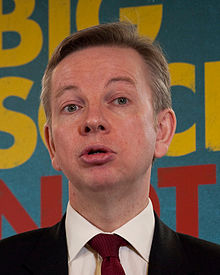Michael Gove and the History Curriculum: What kind of Island Story?
 Since his appointment as Education Secretary in 2010, Michael Gove has been intent on ‘reforming’ the school history curriculum, managing to alienate even some of his right-wing advisors in the attempt. Gove has argued that Britain’s status as an island is core to our history. Keith Flett thinks that he might have a point here – but interprets its importance in a very different way.
Since his appointment as Education Secretary in 2010, Michael Gove has been intent on ‘reforming’ the school history curriculum, managing to alienate even some of his right-wing advisors in the attempt. Gove has argued that Britain’s status as an island is core to our history. Keith Flett thinks that he might have a point here – but interprets its importance in a very different way.
Michael Gove has an upper second degree in English from Oxford, which while is certainly does not prevent him from commenting on and having an opinion about history, does not particularly make him an authority on the subject.
Yet Gove, as Education Secretary in a Coalition Government, has loomed large in discussions about school history.
This is what he wrote in October 2010:
One of the under-appreciated tragedies of our time has been the sundering of our society from its past.
Children are growing up ignorant of one of the most inspiring stories I know – the history of our United Kingdom.
Our history has moments of pride, and shame, but unless we fully understand the struggles of the past we will not properly value the liberties of the present.
The current approach we have to history denies children the opportunity to hear our island story. Children are given a mix of topics at primary, a cursory run through Henry the Eighth and Hitler at secondary and many give up the subject at 14, without knowing how the vivid episodes of our past become a connected narrative. Well, this trashing of our past has to stop.
At this point Gove announced that Simon Schama had been appointed to address the matter. As Schama recently reminded us at a memorial meeting for Eric Hobsbawm, while some may debate his historical judgements, he remains an historian of the left.
Schama disappeared from Gove’s history, as the ideology was ramped up. In his place came the undisputedly right-wing Niall Ferguson. More recently Gove has noted that his views on school history have also been influenced by a range of right-wing historians including David Starkey who is without doubt very right-wing indeed.
Gove’s emphasis has been on trying to ‘fiddle’ with the school history curriculum. I use the word advisedly. He is not making the kind of structural changes to it that would require Parliamentary scrutiny. Rather he is tinkering.
Proposals for a new history curriculum content appeared earlier this year and were subsequently spirited off by Gove and his team for revision. It was not clear exactly what transpired but at the end of the process Gove’s right-wing advisors on history were to be found criticising him rather than supporting him. Niall Ferguson produced a critical piece for The Guardian.
In the meantime a campaign had at least prevented Gove and other Tory ideologues from removing significant figures in black British history such as Mary Seacole from the curriculum altogether.
The most recent Gove history intervention has come in a speech at the Brighton conference in early May. Here Gove again supported school history as our island story and criticised existing school history teaching. In particular he was concerned that an exercise with Mr Men was being used to teach pupils about Hitler.
As with so much of Gove’s thoughts this was ideological bluster not reality. What was actually happening was that a group of senior pupils who had already learnt about Hitler by the usual method of studying the subject, were using Mr Men characters in an exercise with more junior pupils to demonstrate that they had grasped the essence of the matter.
Gove was quizzed about the matter at a Commons Select Committee on Education on 15th May. Here he revealed the source for his Mr Men comments. It was- Gove. He had ‘researched’ the matter himself. He had of course come to the wrong conclusion about what was happening but instead of apologising he noted that no one could argue that Mr Men was involved in the teaching of history at a particular school.
Still, perhaps Gove does have a point about our island story. It is one of colonialism, imperialism, a bloody Empire and slavery. It is also a story of those who fought back. The work of historians like Peter Linebaugh and Marcus Rediker on the Black Atlantic has demonstrated that the history of the British Isles must go much further than Britain itself. Perhaps a figure like William Cuffay, the son of a black slave from St Kitts who had travelled to Medway as a cook on a British Navy ship, went on to become the leader of London Chartism and was transported to Tasmania for his efforts should be the cornerstone of Gove’s history curriculum.
5 comments
5 responses to “Michael Gove and the History Curriculum: What kind of Island Story?”
Left Unity is active in movements and campaigns across the left, working to create an alternative to the main political parties.
About Left Unity
Read our manifesto
Left Unity is a member of the European Left Party. 
Read the European Left Manifesto
ACTIVIST CALENDAR
Events and protests from around the movement, and local Left Unity meetings.

Saturday 21st June: End the Genocide – national march for Palestine
Join us to tell the government to end the genocide; stop arming Israel; and stop starving Gaza!
More details here
Summer University, 11-13 July, in Paris
Peace, planet, people: our common struggle
The EL’s annual summer university is taking place in Paris.
More events »
GET UPDATES
Sign up to the Left Unity email newsletter.
CAMPAIGNING MATERIALS
Get the latest Left Unity resources.



As a History teacher I would see my aim as developing students as historians as much as teaching them History. I have worked in the Arab world for many years and I have to say that ‘British’ history – imperialism, industrialisation, imperialism, the response to Hitler and fascism – has a resonance with my students. (I’ve taught a unit on the English Civil War in Saudi Arabia) There is such a richness in those topics that students can truly feel those stories.
But I suspect that what is at issue for Gove (and Ferguson for that matter) is not what is taught but how it is taught. If cease to look to events in the past which have a continuing relevance for our students today, stories that can inspire but also about which they can empathise and instead have to adopt a prescribed ‘connected narrative’ approach then we retreat to teaching History instead of allowing students to develop the skills to become Historians themselves. There needs to be space for students to ask the critical questions about how History is constructed and for what purposes.
But the chances of Gove actually saying what he means are limited I suspect.
I think David is right ^^. Gove and Ferguson are trying to make us return to the celebratory histories of the 19th century. It seems like a desperate attempt from an out of touch government to instill a sense of ‘national identity’ into the people. It can’t work!
I doubt there’ll be much about the Georgian/Victorian financial system and the motivations behind so many workers’ revolts. The management practises of Arkwright, Strutt and Robert Owen, compared with the situation in, say, Litton Mill. It would shed an uncomfortable light on the post-Thatcher economy.
Gove’s policy as well as a narrow imperial view of history and deference is to dumb down education in generall. it is Free Schools, Academies, Grammar schools then university for the m class kids then the intteresting jobs as the future mangers of capitalism THE WHEAT for them. And a servile w class THE CHAFF cheap labour and dull but important jobs or an industrial reserve army to cower the workforce. LU could have a simple education policy DEMOCRATIC SCHOLS accountable to local communities and FREE FE & FREE HE paid for by taxing big business they take all these graduates for free and pay not a penny!
We should be buiiding a society of critical thinkers and
Education should not be a chore that is dutiful
But where we seek ‘the truth, the good and the beautiful”
We could also remove tax relief on private education and abolish the charitable status for elite public schools – surely the m class parents wouldn’t object to paying the true market rate or is it MARKET FORCES FOR US AND NOT FOR THEM!
I would also like genuine community development strategies for poor communities and funding for more adult education which follows the approach advocated by Paulo Freire to empower the oppressed.
Yours in solidarity!
History has of course always traditionally been an exercise in propaganda. Modern methods of teaching to interpret and reflect on the different perspectives of those affected by historical events, is of course a helpful progression in a society that values diversity. I consider myself to have a mildly right wing perspective, but I still want my children to be able to develop their own assessment of the reasons for and impact of change, revolution, war, peace treaties etc on the various factions of society. I do not want them to be taught a rigid story.